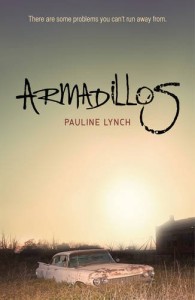 Published by Legend Press 1 April 2016
Published by Legend Press 1 April 2016
288pp, paperback, £8.99
Reviewed by Lesley Glaister
It’s sometimes claimed that the techniques of method acting and of writing are similar. In order to fully inhabit a scripted character, an actor considers motivation, physicality, habits, likes and dislikes, but above all voice. That P.K. Lynch is an actor, and that the first person voice she uses in Armadillos is so brilliant, makes the idea of this connection irresistible.
The voice of Aggie, a ‘sub’ (i.e. sub human) teenager from the wilds of Texas is raw, honest, funny, touching and above all so utterly authentic that I was startled to read in the ‘How it all Started’ section at the end of the novel that Lynch had to research how to write this American English. It’s not just that it’s authentically Texan though, it’s authentically individual, idiosyncratic, the fingerprint of a personality. There’s an odd poetry in the simple vocabulary: ‘his eyes like water and mud’; ‘a rash of stars measled the sky’; some fantastic throw away lines: ‘I slept in an empty water fountain and spent the time counting bats’ and hardly a page goes by with at least one deliciously humorous observation: ‘… a grizzly sort of fella, as big as any man I’d seen, with a face so full of hair you could have kept rodents in there.’
Brought up in poverty and misery, Aggie escapes her abusive father and sets off into the world with absolutely nothing, living on her wits and the protective instincts borne of her brutal background. The novel grips right from the start both because it’s a cracking story and because Aggie is such an immediately sympathetic character. Although she lies, steals and cheats almost as a reflex, it is impossible not to root for her as she hustles her way through real dangers, meeting a cast of vividly entertaining and dodgy chancers on her way. After a hair-raising road trip she arrives in the city of Dallas, makes friends with some squatters and settles down for a time within an eccentric household of damaged drifters amongst whom she finds friendship. By the end of the novel she’s on the move again and has reached some clarity and the beginnings (perhaps) of peace of mind, through learning some nasty and necessary home truths.
Though this ending is good and emotionally right for the book, I got the slight sense of a writer running out of steam, so that, satisfying as it is, the ending seems to come too quickly and easily after Aggie’s long, hard struggle to get there.
Not that the book is a struggle to read, far from it. I raced through it finding a treat on every page. It’s shocking, painful, sad, hilarious and ultimately quietly profound. What a stunning debut.
